| |
Date |
Event(s) |
| 1 | 1648 | - 1648—1648: Society of Friends (Quakers) founded by George Fox
- 1648—1648: First practical thermometers made
|
| 2 | 1649 | - 1649—1649: Cromwell's Irish campaign starts
- 1649—1649: King Charles II proclaimed King of Scots and England in Scotland
- 6 Jan 1649—6 Jan 1649: 'Rump' Parliament votes to put Charles I on trial
- 30 Jan 1649—30 Jan 1649: King Charles I executed
- 19 May 1649—19 May 1649: Commonwealth declared
- 20 Dec 1649—20 Dec 1649: Theatres banned by Cromwell
- 20 Dec 1649—20 Dec 1649: Christmas banned by Cromwell
|
| 3 | 1650 | - 1650—1650: Coffee brought to England about this time
|
| 4 | 1651 | - 1651—1651: The second English Civil War (1651-1652)
- 1651—1651: Scottish prisoners transported to the British settlements in America
- 3 Sep 1651—3 Sep 1651: Battle of Worcester
|
| 5 | 1653 | - 1653—1653: Commonwealth registers start
- 1653—1653: Under the Act of Settlement Cromwell's opponents stripped of land
- 1653—1653: Provincial probate courts abolished - probates granted only in London
- 20 Apr 1653—20 Apr 1653: Cromwell dissolves the Rump Parliament
- 16 Dec 1653—16 Dec 1653: Oliver Cromwell becomes Lord Protector of the Commonwealth of England,
Scotland and Ireland
|
| 6 | 1657 | - 1657—1657: Post Office established by Act of Parliament [others say 1660]
- 1657—1657: A few Jews permitted to settle in England
|
| 7 | 1658 | - 1658—1658: Richard Cromwell (son of Oliver) Lord Protector (-1660)
- 3 Sep 1658—3 Sep 1658: Death of Oliver Cromwell
|
| 8 | 1659 | - 1659—1659: Start of national meteorological Temperature records in the UK
- 6 Feb 1659—6 Feb 1659: Date of first known bank cheque to be drawn
|
| 9 | 1660 | - 1660—1660: Commonwealth registers ended, Parish Registers resumed
- 1660—1660: Provincial Probate Courts re-established
- 1660—1660: Clarendon code restricts Puritans' religious freedom
- 1660—1660: Composition of light discovered by Newton
- 1660—1660: Honourable East India Company founded by British
- 1 Jan 1660—1 Jan 1660: Samuel Pepys starts his diary
- 29 May 1660—29 May 1660: Restoration of British monarchy (Charles II) - 'Oak Apple Day' - theatres
reopened
- 17 Oct 1660—17 Oct 1660: Ten Regicides are executed at Charing Cross or Tyburn
- 28 Nov 1660—28 Nov 1660: Twelve men, including Christopher Wren, Robert Boyle, John Wilkins, and Sir
Robert Moray decide to found what is later known as the Royal Society
- 8 Dec 1660—8 Dec 1660: First actress plays in London (Margaret Hughes as Desdemona)
|
| 10 | 1661 | - 1661—1661: Restoration of Episcopacy in Scotland
- 1661—1661: Board of Trade founded in London
- 1661—1661: Hand-struck postage stamps first used
- 1661—1661: Corporation Act prevents non-Anglicans from holding municipal office
- 30 Jan 1661—30 Jan 1661: Oliver Cromwell formally 'executed', having been dead for over two years!
|
| 11 | 1662 | - 1662—1662: 'Hearth Tax' introduced - until 1689 (1690 in Scotland)
- 1662—1662: Poor Relief Act or Act of Settlement' - gave JPs the power to return any wandering
poor to the parish of origin (repealed 1834)
- 1662—1662: Tea introduced to Britain
- 24 Aug 1662—24 Aug 1662: Act of Uniformity - Acceptance of Book of Common Prayer required - About
2,000 vicars and rectors driven from their parishes as nonconformists (Presbyterians and
Independents) - Persecution of all non-conformists - Presbyterianism dis-established -
Episcopalian Church of England restored
|
| 12 | 1664 | - 29 May 1664—29 May 1664: Oak Apple Day - the birthday of Charles II and the day when he entered
London at the Restoration; commanded by Act of Parliament in 1664 to be observed as a day
of thanksgiving. A special service (expunged in 1859) was inserted in the Book of Common
Prayer and people wore sprigs of oak with gilded oak-apples on that day.
- 27 Aug 1664—27 Aug 1664: Nieuw Amsterdam becomes New York as 300 English soldiers under Col.
Mathias Nicolls take the town from the Dutch under orders from Charles II. The town is
renamed after the King's brother James, Duke of York
|
| 13 | 1665 | - 1665—1665: Great Plague of London (July-October) kills over 60,000
- 1665—1665: Five-mile Act restricts non-conformist ministers in Britain
- 7 Nov 1665—7 Nov 1665: The ?London Gazette' first published - one of the official journals of record of the
United Kingdom government and the oldest continuously published newspaper in the
United Kingdom
|
| 14 | 1666 | - 1666—1666: Use of semaphore signalling pioneered by Lord Worcester
- 1666—1666: Newton formulated Laws of Gravity
- 2 Sep 1666—2 Sep 1666: Great Fire of London, after a drought beginning 27 June (2-6 Sep)
|
| 15 | 1668 | - 1668—1668: British East India Company obtains control of Bombay
- 1668—1668: Newton constructs reflecting telescope
|
| 16 | 1669 | - 31 May 1669—31 May 1669: Last entry in Pepys's diary
|
| 17 | 1670 | - 26 May 1670—26 May 1670: King Charles II and King Louis XIV of France sign the Secret Treaty of Dover
|
| 18 | 1671 | - 9 May 1671—9 May 1671: Thomas Blood caught stealing the Crown Jewels
|
| 19 | 1672 | - 1672—1672: High Court of Justiciary established in Scotland
- 1672—1672: War with Holland (to 1674) - British Army increased to 10,000 men
|
| 20 | 1673 | - 1673—1673: First Test Act deprives British Catholics and Non-conformists of Public Office
|
| 21 | 1674 | - 10 Nov 1674—10 Nov 1674: Treaty of Westminster - Netherlands cedes New Netherlands (on the eastern
coast of North America) to Britain
|
| 22 | 1675 | - 1675—1675: Beginning of Whig party under Shaftsbury
- 1675—1675: Rebuilding of St Paul's started by Wren (completed 1710)
- 4 Mar 1675—4 Mar 1675: John Flamsteed appointed first Astronomer Royal of England
- 10 Aug 1675—10 Aug 1675: Building of Royal Greenwich Observatory started
|
| 23 | 1676 | - 1676—1676: Compton Census, named after its initiator Henry Compton, Bishop of London, was
intended to discover the number of Anglican conformists, Roman Catholic recusants and
Protestant dissenters in England and Wales from enquiries made in individual parishes
|
| 24 | 1677 | - 1677—1677: Lee's Collection of Names of Merchants in London' published
|
| 25 | 1678 | - 1678—1678: Extension of Test Act to peers
|
| 26 | 1679 | - 1679—1679: Tories first so named
- 27 May 1679—27 May 1679: Habeas Corpus Act becomes law in England - (later repealed from time to
time)
|
| 27 | 1680 | - 1680—1680: William Dockwra(y) begins his London Penny Post
- 1680—1680: Dodo becomes extinct in Mauritius through over-hunting
|
| 28 | 1681 | - 1681—1681: Second Test Act (against non-conformists) passed by Westminster Parliament
- 1681—1681: Oil lighting first used in London streets
|
| 29 | 1682 | - 1682—1682: Pennsylvania founded by William Penn
- 1682—1682: Library of Advocates founded in Edinburgh - later National Library of Scotland
- 1682—1682: Halley observes the comet which bears his name
|
| 30 | 1683 | - 1683—1683: Wild boar become extinct in Britain
- 6 Jun 1683—6 Jun 1683: Ashmolean Museum opened at Oxford - first museum in Britain
|
| 31 | 1685 | - 1685—1685: James the Second (1685-1689, died 1701) - Monmouth rebellion and battle of
Sedgemoor - British Army raised to 20,000 men
- 1685—1685: Earl of Argyll's Invasion of Scotland
- 1685—1685: Judge Jeffreys and the Bloody Assizes - 320 executed, 800 transported
|
| 32 | 1686 | - 1686—1686: Release of all prisoners held for their religious beliefs
|
| 33 | 1687 | - 4 Apr 1687—4 Apr 1687: James II issues the Declaration of Indulgence, suspending laws against Catholics
and non-conformists
- 5 Jul 1687—5 Jul 1687: Newton published his Philosophiae Naturalis Principia Mathematica' - written
in Latin
|
| 34 | 1688 | - 1688—1688: British Army raised to 40,000
- 1688—1688: Bill of Rights limits the powers of the monarchy over parliament
- 1688—1688: Hearth Tax abolished
- 1688—1688: Mutiny Act
- Feb 1688—Feb 1688: Edward Lloyd's Coffee House opens - later became Lloyd's of London
- Nov 1688—Nov 1688: The Glorious Revolution: James II abdicates
- 5 Nov 1688—5 Nov 1688: William of Orange lands at Torbay
- Dec 1688—Dec 1688: Siege of Londonderry (began Dec 1688; ended 28 Jul 1689)
|
| 35 | 1689 | - 1689—1689: Devonport naval dockyard established
- 13 Feb 1689—13 Feb 1689: William III and Mary II, daughter of James II, jointly take the throne (only William, however, has regal power)
- 12 Mar 1689—12 Mar 1689: Deposed James VII & II flees to Ireland - defeated at the Battle of the Boyne (1
Jul 1690)
- 24 May 1689—24 May 1689: Toleration Act passed for Protestant non-conformists
- 27 Jul 1689—27 Jul 1689: Battle of Killiecrankie in Scotland - Jacobites defeated Government troops but
at high cost
- 16 Dec 1689—16 Dec 1689: Bill of Rights passed by Parliament, ending King's divine right to raise taxes or
wage war
|
| 36 | 1690 | - 20 May 1690—20 May 1690: England passes Act of Grace, forgiving Roman Catholic followers of James II
|
| 37 | 1692 | - 1692—1692: Land Tax introduced - originally designed as an annual tax on personal estate, public
offices and land. For practical purposes, however, assessors tended to avoid assessing items of
wealth other than landed property so that it became known as the Land Tax.
- 1692—1692: French intention to invade England came to nothing
- 13 Feb 1692—13 Feb 1692: The massacre of Glencoe - Clan Campbell sides with King William and
murders members of Clan McDonald
|
| 38 | 1693 | - 4 Aug 1693—4 Aug 1693: Date traditionally ascribed to Dom Pierre P?rignon 's invention of Champagne
|
| 39 | 1694 | - 1694—1694: National Debt came into effect in England
- 1694—1694: Stamp Duties introduced into Britain from Holland
- 1694—1694: Mary II death leaves William III as sole ruler
- 1694—1694: Triennial Act, new Parliamentary elections every three years
- 1694—1694: Scotland: Poll Tax imposed on all over sixteen, except the destitute and insane (-1699)
- 27 Jul 1694—27 Jul 1694: Bank of England founded by William Paterson (a Scot)
|
| 40 | 1695 | - 1695—1695: Freedom of Press in England granted
- 1695—1695: Bank of Scotland founded
- 1695—1695: Act of Parliament imposes a fine on all who fail to inform the parish minister of the
birth of a child (repealed 1706)
- 1695—1695: Start of Dissenters' lists in parish registers - children born but not christened in the
parish church - some were named 'Papist' and others 'Protestants'
|
| 41 | 1697 | - 2 Dec 1697—2 Dec 1697: Official opening of St Paul's Cathedral
|
| 42 | 1698 | - 1698—1698: Invention of steam engine by Capt Thomas Savery
- 1698—1698: Darien Expedition: a disastrous attempt to establish a Scots settlement in Panama
- 1698—1698: Duties (taxes) on entries in parish registers - repealed after five years
- 4 Jan 1698—4 Jan 1698: Most of the Palace of Whitehall in London destroyed by fire
- 14 Nov 1698—14 Nov 1698: Eddystone Lighthouse (Henry Winstanley's) first lit; completed 10 days earlier
|
| 43 | 1700 | - 1700—1700: Population in England and Scotland approx 7.5 million
|
| 44 | 1701 | - 1701—1701: Act of Settlement bars Catholics from the British throne
- 23 May 1701—23 May 1701: After being convicted of piracy and murdering William Moore, Captain
William Kidd hanged in London
|
| 45 | 1702 | - 8 Mar 1702—8 Mar 1702: Anne Stuart becomes Queen
- 11 Mar 1702—11 Mar 1702: First English daily newspaper The Daily Courant (till 1735)
|
| 46 | 1703 | - 4 Aug 1703—4 Aug 1703: British take Gibraltar
- 24 Nov 1703—24 Nov 1703: Climate: Most violent storms of the millennium cause vast damage
across southern England - about a third of Britain's merchant fleet lost, and Eddystone
lighthouse destroyed on 27 November (Nov 24 - Dec 2)
|
| 47 | 1704 | - 1704—1704: Penal Code enacted - Catholics barred from voting, education and the military
- 13 Aug 1704—13 Aug 1704: Battle of Blenheim
|
| 48 | 1705 | - 1705—1705: First workable steam pumping engine devised by Thomas Newcomen (some say c1710
or 1711)
- 1705—1705: Isaac Newton knighted (for his work at the Royal Mint)
|
| 49 | 1706 | - 1706—1706: First evening newspaper The Evening Post' issued in London
|
| 50 | 1707 | - 16 Jan 1707—16 Jan 1707: Union with Scotland - Scots agree to send 16 peers and 45 MPs to English
Parliament in return for full trading privileges - Scottish Parliament meets for the last time in
March
- 1 May 1707—1 May 1707: English and Scottish Parliaments united by an Act of the English Parliament -
The Kingdom of Great Britain established - largest free-trade area in Europe at the time
|
| 51 | 1708 | - 1708—1708: First Jacobite rising in Scotland
- 1708—1708: Earliest Artillery Muster Rolls
|
| 52 | 1709 | - 1709—1709: Second Eddystone lighthouse completed
- 1709—1709: First Copyright Act pass
- 1709—1709: Bad harvests throughout Europe - bread riots in Britain
- 2 Feb 1709—2 Feb 1709: Alexander Selkirk rescued from shipwreck on a desert island, inspiring the book
Robinson Crusoe (published in 1719) by Daniel Defoe
|
| 53 | 1710 | - 1710—1710: Tax on Apprentice Indentures introduced
|
| 54 | 1711 | - 1711—1711: Incorporation of South Sea Company, in London
- 11 Aug 1711—11 Aug 1711: First race meeting at Ascot
|
| 55 | 1712 | - 1712—1712: Imposition of Soap Tax (abolished 1853)
- 1712—1712: Last trial for witchcraft in England (Jane Wenham)
- 1712—1712: Toleration Act passed - first relief to non-Anglicans
|
| 56 | 1713 | - 1713—1713: By this year there are some 3,000 coffee houses in London
|
| 57 | 1714 | - 1714—1714: Longitude Act: prize of ?20,000 offered to the inventor of a workable method of
determining a ship's longitude (won by John Harrison in 1773 for his chronometer).
- 1714—1714: Schism Act, prevents Dissenters from being schoolmasters in England
- 1714—1714: Landholders forced to take the Oath of Allegiance and renounce Roman Catholicism
- 1 Aug 1714—1 Aug 1714: Queen Anne Stuart dies - George I Hanover becomes king (1714-1727).
|
| 58 | 1715 | - 1715—1715: Second Jacobite rebellion in Scotland, under the Old Pretender ('The Fifteen')
- 1 Aug 1715—1 Aug 1715: Riot Act passed
|
| 59 | 1716 | - 1716—1716: The Septennial Act of Britain leads to greater electoral corruption - general elections
now to be held once every 7 years instead of every 3 (until 1911)
- 1716—1716: Climate: Thames frozen so solid that a spring tide lifted the ice bodily 13ft without
interrupting the frost fair
|
| 60 | 1717 | - 1717—1717: First Masonic Lodge opens in London
- 1717—1717: Value of the golden guinea fixed at 21 shillings
|
| 61 | 1719 | - 1719—1719: Third abortive Jacobite rising
|
| 62 | 1720 | - 1720—1720: South Sea Bubble, a stock-market crash on Exchange Alley - government assumes
control of National Debt
- 1720—1720: Manufacturing towns start to increase in population - rise of new wealth
- 1720—1720: Wallpaper becomes fashionable in England
|
| 63 | 1721 | - 2 Apr 1721—2 Apr 1721: Robert Walpole (Whig) becomes first Prime Minister (to 1742)
|
| 64 | 1722 | - 1722—1722: Last trial for witchcraft in Scotland
- 1722—1722: Knatchbull's Act, poor laws
|
| 65 | 1723 | - 1723—1723: Excise tax levied for coffee, tea, and chocolate
- 1723—1723: The Waltham Black Acts add 50 capital offences to the penal code - people could be
sentenced to death for theft and poaching - repealed in 1827
- 1723—1723: The Workhouse Act or Test - to get relief, a poor person has to enter Workhouse
|
| 66 | 1724 | - 1724—1724: Rapid growth of gin drinking in England
- 1724—1724: Longman's founded (Britain's oldest publishing house)
|
| 67 | 1726 | - 1726—1726: First circulating library opened in Edinburgh
- 1726—1726: Invention of the chronometer by John Harrison
|
| 68 | 1727 | - 1727—1727: Board of Manufacturers established in Scotland
- 11 Jun 1727—11 Jun 1727: George I dies - George II Hanover becomes king
|
| 69 | 1729 | - 9 Nov 1729—9 Nov 1729: Treaty of Seville signed between Britain, France and Spain - Britain maintained
control of Port Mahon and Gibraltar
|
| 70 | 1730 | |
| 71 | 1731 | - 1731—1731: Invention of seed drill by Jethro Tull [others say 1701]
- 1731—1731: Invention of sextant by John Hadley
|
| 72 | 1732 | - 7 Dec 1732—7 Dec 1732: Covent Garden Opera House opens
|
| 73 | 1733 | - 1733—1733: Excise crisis: Sir Robert Walpole wanted to add excise tax to tobacco and wine -
Pulteney and Bolingbroke oppose the excise tax
- 1733—1733: Law forbidding the use of Latin in parish registers generally obeyed - some continued in
Latin for a few years
- 1733—1733: John Kay invents the flying shuttle, revolutionised the weaving industry
|
| 74 | 1734 | - 1734—1734: Kent's Directory published
|
| 75 | 1737 | - 1737—1737: Licensing Act restricts the number of London theatres and subects plays to censorship
of the Lord Chamberlain (till 1950s)
|
| 76 | 1738 | - 24 May 1738—24 May 1738: John Wesley has his conversion experience
|
| 77 | 1739 | - 1739—1739: Wesley and Whitefield commence great Methodist revival
- 7 Apr 1739—7 Apr 1739: Dick Turpin, highwayman, hanged at York
- 23 Oct 1739—23 Oct 1739: War of Jenkins' Ear starts: Robert Walpole reluctantly declares war on Spain
|
| 78 | 1741 | - 1741—1741: Benjamin Ingham founded the Moravian Methodists or Inghamites - Earliest Moravian
registers
|
| 79 | 1742 | - 1742—1742: England goes to war with Spain - incited by William Pitt the Elder (Earl of Chatham)
for the sake of trade
|
| 80 | 1743 | - 16 Jun 1743—16 Jun 1743: (June 27 in Gregorian calendar): Battle of Dettingen - last time a British
sovereign (George II) led troops in battle
|
| 81 | 1744 | - 1744—1744: Tune 'God Save the King' makes its appearance
|
| 82 | 1745 | - 1745—1745: Jacobite rebellion in Scotland ('The Forty-five')
- 19 Aug 1745—19 Aug 1745: Bonnie Prince Charlie (The Young Pretender) lands in the western Highlands -
raises support among Episcopalian and Catholic clans - The Pretender's army invades Perth,
Edinburgh, and England as far as Derby
|
| 83 | 1746 | - 16 Apr 1746—16 Apr 1746: Battle of Culloden - last battle fought in Britain - 5,000 Highlanders routed by
the Duke of Cumberland and 9,000 loyalists Scots - Young Pretender Charles flees to
Continent, ending Jacobite hopes forever - the wearing of the kilt prohibited
|
| 84 | 1747 | - 1747—1747: Abolition of Heritable Jurisdictions in Scotland
- 1747—1747: Act for Pacification of the Highlands
|
| 85 | 1749 | - 27 Apr 1749—27 Apr 1749: First performance of Handel's Music for the Royal Fireworks (in Green Park,
London)
|
| 86 | 1750 | - Feb 1750—Feb 1750: Series of earthquakes in London and the Home Counties cause panic with
predictions of an apocalypse (Feb/Mar)
- 16 Nov 1750—16 Nov 1750: Original Westminster Bridge opened (replaced in 1862 due to subsidence)
|
| 87 | 1751 | - Mar 1751—Mar 1751: Chesterfield's Calendar Act passed - royal assent to the bill was given on 22
May 1751 - decision to adopt Gregorian Calendar in 1752: In and throughout all his
|
| 88 | 1752 | - 1752—1752: Benjamin Franklin invents the lightning conductor
- 1 Jan 1752—1 Jan 1752: Beginning of the year 1752 [Scotland had adopted January as the start of the year
in 1600, and some other countries in Europe had adopted the Gregorian calendar as early as
1582]
- 3 Sep 1752—3 Sep 1752: Julian Calendar dropped and Gregorian Calendar adopted in England and
Scotland, making this Sep 14
|
| 89 | 1753 | - 1753—1753: Private collection of Sir Hans Sloane forms the basis of the British Museum
- 1 May 1753—1 May 1753: Publication of ?Species Plantarum' by Linnaeus and the formal start date of plant
taxonomy
|
| 90 | 1754 | - 1754—1754: Hardwicke Act (1753): Banns to be called, and Printed Marriage Register forms to be
used - Quakers & Jews exempt
- 1754—1754: In the General Election, the Cow Inn at Haslemere, Surrey caused a national scandal by
subdividing the freehold to create eight votes instead of one
- 1754—1754: First British troops not belonging to the East India Company despatched to India
- 1754—1763:
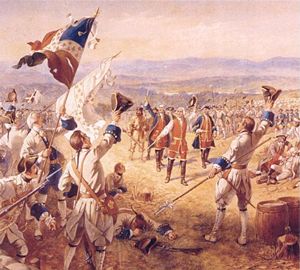 The French and Indian War The French and Indian War
|
| 91 | 1755 | - 1755—1755: Publication of Dictionary of the English Language' by Dr Samuel Johnson
- 1755—1755: Period of canal construction began in Britain (till 1827)
- 2 Dec 1755—2 Dec 1755: Second Eddystone Lighthouse destroyed by fire
|
| 92 | 1756 | - 15 May 1756—15 May 1756: The Seven Years War with France (Pitt's trade war) begins
- Jun 1756—Jun 1756: Black Hole of Calcutta - 146 Britons imprisoned, most die according to British
sources
|
| 93 | 1757 | - 1757—1757: The foundation laid for the Empire of India
- 14 Mar 1757—14 Mar 1757: Admiral Byng shot at Portsmouth for failing to relieve Minorca
- 23 Jun 1757—23 Jun 1757: The Nawab of Bengal tries to expel the British, but is defeated at the battle of
Plassey (Palashi, June 23) - the East India Company forces are led by Robert Clive
|
| 94 | 1758 | - 1758—1758: India stops being merely a commercial venture - England begins dominating it
politically - The East India Company retains its monopoly although it ceased to trade
|
| 95 | 1759 | - 1759—1759: Wesley builds 356 Methodist chapels
- 15 Jan 1759—15 Jan 1759: British Museum opens to the public in London
- 16 Oct 1759—16 Oct 1759: Third Eddystone Lighthouse (John Smeaton's) completed
|
| 96 | 1760 | - 1760—1760: Carron Iron Works in operation in Scotland
- 5 May 1760—5 May 1760: First use of hangman's drop
- 25 Oct 1760—25 Oct 1760: George II dies - George III Hanover, his grandson, becomes king. The date conventionally marks the start of the so-called first Industrial Revolution'
|
| 97 | 1761 | - 16 Jan 1761—16 Jan 1761: British capture Pondicherry, India from the French
|
| 98 | 1762 | - 1762—1762: Cigars introduced into Britain from Cuba
|
| 99 | 1763 | - 1763—1763: Treaty of Paris - gives back to France everything Pitt fought to obtain - (Newfoundland
[fishing], Guadaloupe and Martininque [sugar], Dakar [gum]) - but English displaces French
as the international language
|
| 100 | 1764 | - 1764—1764: Lloyd's Register of shipping first prepared
- 1764—1764: Practice of numbering houses introduced to London
- 1764—1764: James Hargeaves invents the Spinning Jenny (but destroyed 1768)
- 1764—1764: Mozart produces his first symphony at age eight
|
| 101 | 1765 | - 1765—1765: The potato becomes the most popular food in Europe
- 22 Mar 1765—22 Mar 1765: Stamp Act passed - imposed a tax on publications and legal documents in the
American colonies (repealed the following year)
|
| 102 | 1766 | - 1766—1766: Start of 'composite' national records on rainfall in the UK
- 5 Dec 1766—5 Dec 1766: Christie's auction house founded in London by James Christie
|
| 103 | 1767 | - 1767—1767: Newcomen's steam pumping engine perfected by James Watt
|
| 104 | 1768 | - 9 Jan 1768—9 Jan 1768: Philip Astley starts his circus in London
- 6 Dec 1768—6 Dec 1768: The first edition of the Encyclopaedia Britannica' published in Edinburgh by
William Smellie
|
| 105 | 1769 | - 1769—1769: Arkwright invents water frame (textile production)
- 1769—1769: Capt James Cook maps the coast of New Zealand
- 6 Sep 1769—6 Sep 1769: David Garrick organises first Shakespeare festival at Stratford-upon-Avon
|
| 106 | 1770 | - 1770—1770: Clyde Trust created to convert the River Clyde, then an insignificant river, into a major
thoroughfare for maritime communications
- 28 Apr 1770—28 Apr 1770: Capt James Cook lands in Australia (Botany Bay) ? Aug 21: formally claims
Australia for Britain
|
| 107 | 1771 | - 1771—1771: Right to report Parliamentary debates established in England
|
| 108 | 1772 | - 1772—1772: First Travellers' Cheques issued by the London Credit Exchange Company
- 1772—1772: Morning Post' first published (until 1937)
- 14 May 1772—14 May 1772: Judge Mansfield rules that there is no legal basis for slavery in England
|
| 109 | 1774 | - 13 Sep 1774—13 Sep 1774: Cook arrives on Easter Island
|
| 110 | 1775 | - 19 Apr 1775—19 Apr 1775: Battle of Lexington: first action in American War of Independence (1775- 1783)
- 19 Apr 1775—3 Sep 1783:
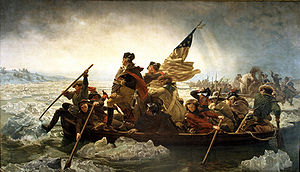 American Revolutionary War American Revolutionary War
|
| 111 | 1776 | - 1776—1776: Somerset House in London becomes the repository of records of population
- 1776—1776: Watt and Boulton produce their first commercial steam engine
- 4 Jul 1776—4 Jul 1776: American Declaration of Independence
- 7 Sep 1776—7 Sep 1776: First attack on a warship by a submarine - David Bushnell's ?Turtle' attacked
HMS Eagle in New York harbour. The attack was perhaps spectacular (a charge did
detonate beneath the ship) but was nevertheless unsuccessful. 'Turtle' was a one man
Affair man-powered [Les Moore]
|
| 112 | 1777 | - 1777—1777: Samuel Miller of Southampton patents the circular saw.
|
| 113 | 1779 | - 1779—1779: Marc Isambard Brunel opens the first steamdriven sawmill at Chatham Dockyard in Kent
- 1779—1779: First iron bridge built, over the Severn by John Wilkinson
- 1779—1779: First Spinning Mills operational in Scotland
- 14 Feb 1779—14 Feb 1779: Capt James Cook killed on Hawaii
- 23 Sep 1779—23 Sep 1779: Naval engagement between Britain and USA off Flamborough Head
|
| 114 | 1780 | - 1780—1780: Male Servants Tax
- 1780—1780: The English Reform Movement - until now, only landowners and tenants (freeholders
with 40 shillings per year or more) allowed to vote, and in open poll books
- 1780—1780: Fountain pen invented
- 1780—1780: About this time the word 'Quiz' entered the language, said to have been invented as a
wager by Mr Daly, a Dublin theatre manager
- 4 May 1780—4 May 1780: First Derby run at Epsom (some say 2nd June)
- 2 Jun 1780—2 Jun 1780: Jun 2- 8: The Gordon Riots - Parliament passes a Roman Catholic relief measure - for
days, London is at the mercy of a mob and destruction is widespread
|
| 115 | 1782 | - 1782—1782: Gilbert's Act establishes outdoor poor relief - the way of life of the poor beginning to
alter due to industrialisation - New factories in rapidly expanding towns required a workforce
that would adjust to new work patterns
- 1782—1782: James Watt patents his steam engine
|
| 116 | 1783 | - 1783—1783: Duty payable on Parish Register entries (3d per entry - repealed 1794) - led to a fall in
entries!
- 3 Sep 1783—3 Sep 1783: Treaty of Versailles (Britain/US)
- 3 Nov 1783—3 Nov 1783: Last public execution at Tyburn in London (John Austin, a highwayman)
|
| 117 | 1784 | - 1784—1784: Pitt's India Act - the Crown (as opposed to officers of the East India Company) has
power to guide Indian politics
- 1784—1784: Wesley breaks with the Church of England
- 1784—1784: First golf club founded at St Andrews
- 1784—1784: Invention of threshing machine by Andrew Meikle
- 2 Aug 1784—2 Aug 1784: First mail coaches in England (4pm Bristol / 8am London)
|
| 118 | 1785 | - 1785—1785: Sunday School Society founded to educate poor children (by 1851, enrols more than 2
million)
- 1785—1795:
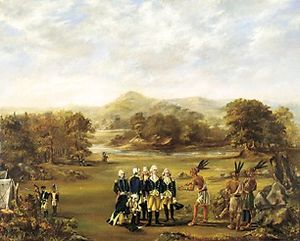 Northwest Indian War Northwest Indian War
- 1 Jan 1785—1 Jan 1785: John Walter publishes first edition of The Times (called The Daily Universal
Register for 3 years)
|
| 119 | 1787 | - 1787—1787: MCC (Marylebone Cricket Club) established at Thomas Lord's ground in London
|
| 120 | 1788 | - 1788—1788: First steamboat demonstrated in Scotland
- 1788—1788: Law passed requiring that chimney sweepers be a minimum of 8 years old (not
enforced)
- 1788—1788: First slave carrying act, the Dolben Act of 1788, regulates the slave trade - stipulates
more humane conditions on slave ships
- 1788—1788: King George III's mental illness occasions the Regency Crisis - Edmund Burke and
Charles James Fox attack ministry of William Pitt - trying to obtain full regal powers for the
Prince of Wales
- 1788—1788: Gibbon completes Decline and Fall of the Roman Empire'
- 26 Jan 1788—26 Jan 1788: First convicts (and free settlers) arrive in New South Wales (left Portsmouth 13
May 1787) ? the 'First Fleet'; eleven ships commanded by Captain Arthur Phillip
|
| 121 | 1789 | - 28 Apr 1789—28 Apr 1789: Mutiny on HMS Bounty - Captain William Bligh and 18 sailors are set adrift
and the rebel crew ends up on Pitcairn Island
- 30 Apr 1789—4 Mar 1797:
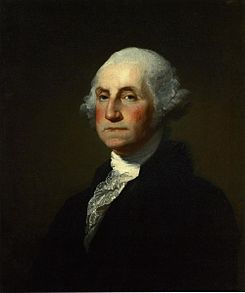 George Washington U.S. Presidency George Washington U.S. Presidency
|
| 122 | 1790 | - 1790—1790: Forth and Clyde Canal opened in Scotland
|
| 123 | 1791 | - 1791—1791: John Bell, printer, abandons the long s' (the 's' that looks like an 'f')
- 1791—1791: Establishment of the Ordnance Survey of Great Britain
- 4 Dec 1791—4 Dec 1791: First publication of The Observer - world's oldest Sunday newspaper
|
| 124 | 1792 | - 1792—1792: Repression in Britain (restrictions on freedom of the press) - Fox gets Libel Act through
Parliament, requiring a jury and not a judge to determine libel
- 1792—1792: Boyle's Street Directory published
- 1792—1792: Coal-gas lighting invented by William Murdock, an Ayrshire Scot
- 1 Oct 1792—1 Oct 1792: Introduction of Money Orders in Britain
- 1 Dec 1792—1 Dec 1792: King's Proclamation drawing out the British militia
|
| 125 | 1793 | - 11 Feb 1793—11 Feb 1793: Britain declares war on France (1793-1802)
- 15 Apr 1793—15 Apr 1793: ?5 notes first issued by the Bank of England
|
| 126 | 1794 | - 1794—1794: Abolition of Parish Register duties
- 6 Oct 1794—6 Oct 1794: The prosecutor for Britain, Lord Justice Eyre, charges reformers with High
Treason - he argued that, since reform of parliament would lead to revolution and revolution
to executing the King, the desire for reform endangered the King's life and was therefore
treasonous
|
| 127 | 1795 | - 1795—1795: The Famine Year
- 1795—1795: Foundation of the Orange Order
- 1795—1795: Speenhamland Act proclaims that the Parish is responsible for bringing up the labourer's
wage to subsistence level - towards the end of the eighteenth century, the number of poor and
unemployed increased dramatically - price increases during the Napoleonic Wars
(1793-1815) far outstripped wage rises - many small farmers were bankrupted by the move
towards enclosures and became landless labourers - their wages were often pitifully low
- 1795—1795: Pitt and Grenville introduce The Gagging Acts' or 'Two Bills' (the Seditious Meetings and Treasonable Practices Bills) - outlawed the mass meeting and the political lecture.
- 1795—1795: Consumption of lime juice made compulsory in Royal Navy
|
| 128 | 1796 | - 1796—1796: Pitt's Reign of Terror': More treason trials - leading radicals emigrate
- 1796—1796: Legacy Tax on sums over ?20 excluding those to wives, children, parents and
grandparents
- 14 May 1796—14 May 1796: Dr Edward Jenner gave first vaccination for smallpox in England
|
| 129 | 1797 | - 1797—1797: England in Crisis, Bank of England suspends cash payments
- 1797—1797: Mutinies in the British Navy at Spithead and Nore
- 1797—1797: Tax on newspapers (including cheap, topical journals) increased to repress radical
publications
- 1797—1797: The first copper pennies were produced ('cartwheels') by application of steam power to
the coining press
- 22 Feb 1797—22 Feb 1797: French invade Fishguard, Wales; last time UK invaded; all captured 2 days later
- 26 Feb 1797—26 Feb 1797: First ?1 (and ?2) notes issued by Bank of England
- 4 Mar 1797—4 Mar 1801:
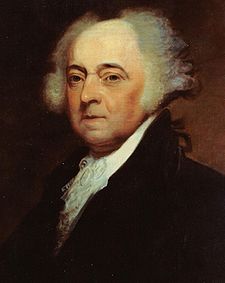 John Adams U.S. Presidency John Adams U.S. Presidency
|
| 130 | 1798 | - 1798—1798: First planned human experiment with vaccination, to test theories of Edward Jenner
- Feb 1798—Feb 1798: The Irish Rebellion; 100,000 peasants revolt; approximately 25,000 die - Irish
Parliament abolished (Feb-Oct)
- 7 Jul 1798—30 Sep 1800:
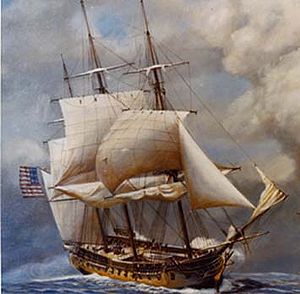 Franco-American War Franco-American War
- 1 Aug 1798—1 Aug 1798: Battle of the Nile (won by Nelson)
|
| 131 | 1799 | - 1799—1799: Foundation of Royal Military College Sandhurst by the Duke of York
- 1799—1799: Foundation of the Royal Institution of Great Britain
- 9 Jan 1799—9 Jan 1799: Pitt brings in 10% income tax, as a wartime financial measure
- 12 Jul 1799—12 Jul 1799: 'Combination Laws' in Britain against political associations and combinations
- 15 Jul 1799—15 Jul 1799: ?Rosetta Stone' discovered in Egypt made possible the deciphering (in 1822) of Ancient Egyptian hieroglyphics
|
| 132 | 1800 | - 1800—1800: Electric light first produced by Sir Humphrey Davy
- 1800—1800: Use of high pressure steam pioneered by Richard Trevithick (1771-1833)
- 1800—1800: Royal College of Surgeons founded
- 1800—1800: Herschel discovers infra-red light
- 1800—1800: Volta makes first electrical battery
- 2 Jul 1800—2 Jul 1800: Parliamentary union of Great Britain and Ireland
|
| 133 | 1801 | - 1801—1801: Grand Union Canal opens in England
- 1801—1801: Elgin Marbles brought from Athens to London
- 1 Jan 1801—1 Jan 1801: Union Jack becomes the official British flag
- 4 Mar 1801—4 Mar 1809:
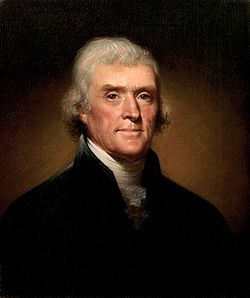 Thomas Jefferson U.S. Presidency Thomas Jefferson U.S. Presidency
- 10 Mar 1801—10 Mar 1801: First census puts the population of England and Wales at 9,168,000. Population of Britain nearly 11 million (75% rural)
- 10 May 1801—10 Jun 1805:
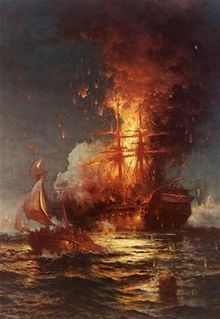 First Barbary War First Barbary War
- 24 Dec 1801—24 Dec 1801: Richard Trevithick built the first self-propelled passenger carrying road loco
|
| 134 | 1802 | - 25 Mar 1802—25 Mar 1802: Treaty of Amiens signed by Britain, France, Spain, and the Netherlands ? the 'Peace of Amiens' as it was known brought a temporary peace of 14 months during the Napoleonic Wars ? one of its most important cultural effects was that travel and correspondence across the English Channel became possible again
|
| 135 | 1803 | - 1803—1803: Poaching made a Capital offense in England if capture resisted
- 1803—1803: Richard Trevithick built another steam carriage and ran it in London as the first
self-propelled vehicle in the capital and the first London bus
- 1803—1803: Semaphore signaling perfected by Admiral Popham
- 30 Apr 1803—30 Apr 1803: Louisiana Purchase: Napoleon sells French possessions in America to United States
- 12 May 1803—12 May 1803: Peace of Amiens ends ? resumption of war with France ? The Napoleonic Wars (1803-18l5)
- 23 Jul 1803—23 Jul 1803: First public railway opens (Surrey Iron Railway, 9 miles from Wandsworth to
Croydon, horse-drawn)
|
| 136 | 1804 | - 1804—1804: Matthew Flinders recommends that the newly discovered country, New Holland, be renamed 'Australia'
- 21 Feb 1804—21 Feb 1804: Richard Trevithick runs his railway engine on the Penydarren Railway (9.5 miles
from Pen-y-Darren to Abercynon in South Wales) this hauled a train with 10 tons of
iron and 70 passengers. It was commemorated by the Royal Mint in 2004 in the form of
A ?2 coin.
- 3 Mar 1804—3 Mar 1804: John Wedgwood (eldest son of the potter Josiah Wedgwood) founds The Royal
Horticultural Society
- 2 Dec 1804—2 Dec 1804: Napoleon declares himself Emperor of the French
- 12 Dec 1804—12 Dec 1804: Spain declares war on Britain
|
| 137 | 1805 | - 1805—1805: London docks opened
- 21 Oct 1805—21 Oct 1805: Admiral Nelson's victory at Trafalgar
- 2 Dec 1805—2 Dec 1805: Battle of Austerlitz; Napoleon defeats Austrians and Russians
|
| 138 | 1806 | - 1806—1806: Dartmoor Prison opened (built by French prisoners)
- 9 Jan 1806—9 Jan 1806: Nelson buried in St Paul's cathedral, London
|



